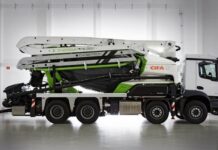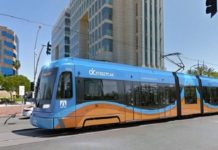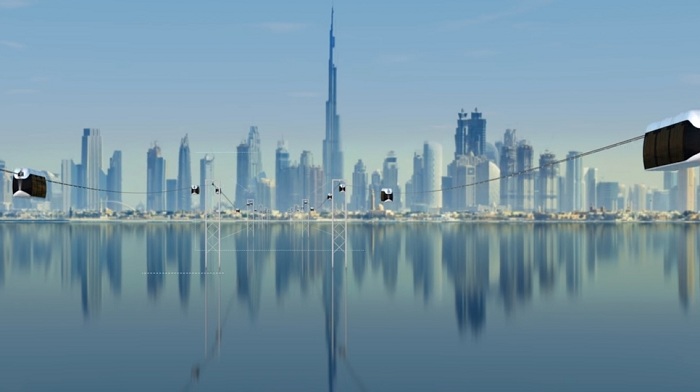The Sharjah Research, Technology, and Innovation Park’s hanging track transport system – the SkyWay project, which is being developed by SkyWay Technologies – has completed 80% of Phase 1 and has begun Phase 2 of development, which will involve driverless pods, called “unicars”, transport passengers and cargo on cables suspended across elevated corridors.
Phase 1 of the SkyWay project witnessed the development of the 400m-long elevated string track and SkyWay stations to transport passengers.
Commenting on Phase 1 of the development, the head of Business Development at SkyWay Technologies, Svetlana Voloshyna told Construction Week: “In this initial stage, we saw the development of driverless pods – or unicars – designed for four people. However, each of these unicars can be designed for anywhere between two to 80 people.”
Voloshyna added: “What makes this transport useful is also the fact that as the population of the smart city increases, we can correspondingly add more pods – or bigger pods – to the same network of elevated string transport, without the need of disrupting the flow and without any additional construction.”
Phase 2 will witness the development of a 2.8km-long elevated track to transport cargo, including containers and bulk transport. This phase is expected to be completed within the next six months.
The project will undergo government tests and standardisation processes before it enters Phase 3, which will involve the development of a single elevated track that will be able to accommodate both cargo and passengers.
The urban transport concept and technology, which is being tested in Sharjah before being marketed on a global scale, aims to cover a 2.8km-stretch from the Sharjah Airport road to the University City road.
Commenting on the project’s benefits, the senior vice president of the Project division of SkyWay GreenTech, Raman Marwaha told Construction Week: “The project is more energy efficient, more cost effective, and a faster means of transport than what currently exists in the market. It has a capacity of running up to 150km.”
Marwaha added: “Its requirement for land parcel as a right of way is extremely less because the columns on which this elevated corridor is built will be sleek – causing it not only to have lesser amount of material used in construction, but also makes it environment friendly.”
Since the construction of the SkyWay project involves strings suspended across slender columns, it will also add to the visual lightness of a smart city rather than the “concrete jungles” created by other traditional transport, Marwaha explains.
The use of less material, such as concrete, also results in considerable cost savings in construction.
The unicars, which run on batteries and a “dynamo system”, also have artificial intelligence capabilities that ensure the safety of passengers. The unicars are able to autonomously detect a problem, can “talk” to each other, and find solutions to rectify a problem.
“For instance, if one of the driverless pods stops midway on the elevated string, it has the capability of realising that it is stuck. It can then communicate with another pod, which will find the stuck pod, and couple with it so as to let the passengers move from one unicar into the other, and travel to safety,” Marwaha explained.





































